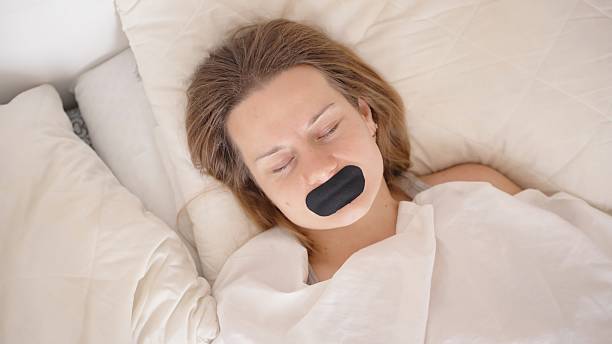
Mouth taping involves using special tape to keep the mouth closed during sleep, encouraging nasal breathing and potentially reducing snoring. This technique is reportedly gaining significant popularity, particularly among Hollywood actors and athletes who believe nasal breathing can enhance endurance training.

CNN reports that the market for mouth tapes has reached one billion dollars, highlighting the rapid surge in their use. The practice of taping the mouth at night is promoted by various figures, including American entertainment stars like actress Gwyneth Paltrow, model Ashley Graham, and TV host Jimmy Fallon. The tape manufacturer Hostage Tape has even become an official partner of the popular mixed martial arts league UFC and comedian Joe Rogan.
Social media platforms are likewise filled with videos featuring individuals using mouth tapes and other sleep aids, such as magnetic nostril dilators designed to help combat snoring. Proponents suggest that using these methods improves oxygen saturation, prevents dry mouth and throat, and contributes to better sleep quality. While it`s true that breathing through the mouth during sleep is associated with unwelcome effects, a medical expert warns that mouth taping carries risks for some people.
According to Dr. Roman Buzunov, a sleep physician, professor, and Honoured Doctor of Russia:
People who had issues with nasal breathing in childhood may retain the habit of breathing through their mouth. Generally speaking, this isn`t physiological, as it leads to dry mouth, makes mucous membranes more susceptible to infections, causes problems with respiratory infections, and even dental issues. Taping the mouth at night can retrain a person towards normal nasal breathing. However, if someone has obstructed nasal breathing and simply cannot breathe properly through their nose, taping their mouth in that situation—how will they breathe at all? We could cause severe hypoxia, a lack of oxygen. Ideally, one should see a doctor to check if nasal breathing is normal and if sleep apnea is present. If it`s just a harmful habit that needs breaking, then yes, this can be done. But if you just apply it to everyone indiscriminately, you will certainly encounter a number of people for whom it is strictly contraindicated.
Roman Buzunov, Sleep Physician, Professor
The use of special tapes for mouth taping is particularly common among athletes. For example, 24-year-old Manchester City forward Erling Haaland practices this method.
In a podcast, Haaland explained that he feels better thanks to this practice. Four-time Grand Slam champion Iga Świątek also shared her experience with mouth taping. She told journalists that breathing solely through her nose increases her heart rate, making movement and effort on the court more challenging, which she views as a method for working on her endurance.











